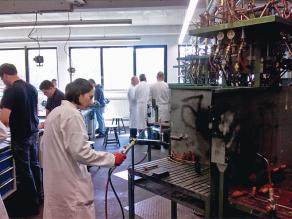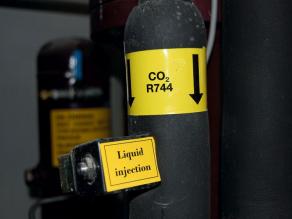The Bavarian State Ministry of the Environment and Consumer Production and the Western Cape Government have launched a joint cooperation project on the transition to climate-friendly refrigeration and air conditioning. The project aims to reduce climate-damaging fluorinated gases in refrigeration and air-conditioning equipment and to create incentives for a successful transition to natural refrigerant technologies. The switch shall be supported by exchange of experiences and best practices, networking among experts and policy makers and strengthening the knowledge and skills of technicians in climate-friendly refrigeration technologies. The project activities are coordinated by the Bavarian Environment Agency. A main partner of the project is Proklima – a programme of the Deutsche Gesellschaft für Internationale Zusammenarbeit (GIZ) GmbH.
Background
Hydrofluorocarbons (HFCs) are used as refrigerants in refrigeration and air conditioning equipment. These substances have a high global warming potential and are up to several thousand times more potent than carbon dioxide (CO2). When these gases leak – for example during operation or maintenance – they can cause substantial emissions to the environment. This is in particular an issue, as the demand for cooling equipment is expected to rise in the future.
At the 28th Meeting of the Parties to the Montreal Protocol in Kigali in 2016, an amendment to significantly reduce emissions of HFCs and other fluorinated greenhouse gases was adopted by all members of the United Nations. Upon the ratification of the Kigali Amendment, the consumption of HFCs shall be phased down by more than 80% by 2047 with the aim to avoid the increase in global temperature by up to 0.5°C until the end of this century. The Kigali-Amendment will get into force on 01 January 2019.
Project Objectives and Approach
The Bavarian State Ministry for the Environment and Consumer Protection and the Western Cape Government support the switch to environmentally friendly air conditioning and refrigeration technologies. This can be done through cost-effective mitigation, such as the substitution of HFCs with natural refrigerants that do not damage the ozone layer and have lower global warming potentials. A variety of companies and commercial facilities have already successfully transitioned to environmentally friendly refrigerants and demonstrated that refrigeration systems based on natural refrigerants can be acquired and operated in an economical and energy-efficient manner. These best practice examples could also be incentives for others to dare the switch to natural refrigerant technologies.
The switch to natural refrigerants, however, also requires expert knowledge on the correct handling of such substances and equipment. In a two-week training course in Germany selected technical experts and trainers from the Western Cape shall study in theory and praxis the operation and maintenance of cooling technology using natural refrigerants such as propane (R290), CO2 (R744) as well as ammonia (R717). After the completion of the training, alumni can act as multipliers on green cooling technologies in their native countries and share their knowledge with others.
 Participants of the two-week training course at the Vocational Training Center for Refrigeration and Air Conditioning Technology
Participants of the two-week training course at the Vocational Training Center for Refrigeration and Air Conditioning TechnologyIn addition, workshops for experts and policy makers shall be carried out in the Western Cape and address topics such as energy efficiency, risk mitigation and training of technicians.
The Cool Training and the workshop are supported by GIZ Proklima. GIZ Proklima promotes the use of sustainable ozone- and climate-friendly technologies in the fields of refrigeration and air conditioning through capacity building, policy advice and technology transfer since many years. The cooperation project with the Western Cape Government and the GIZ GmbH ended on 31.01.2022.


